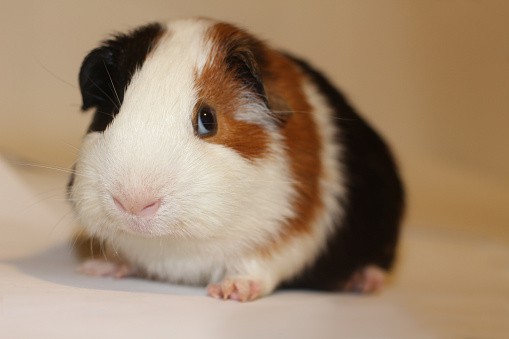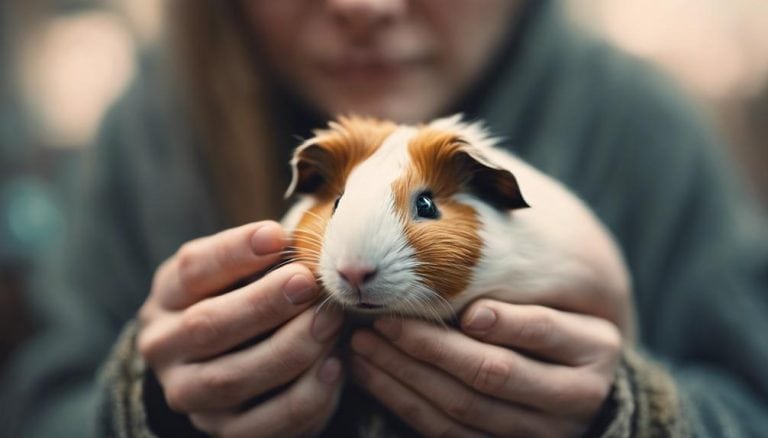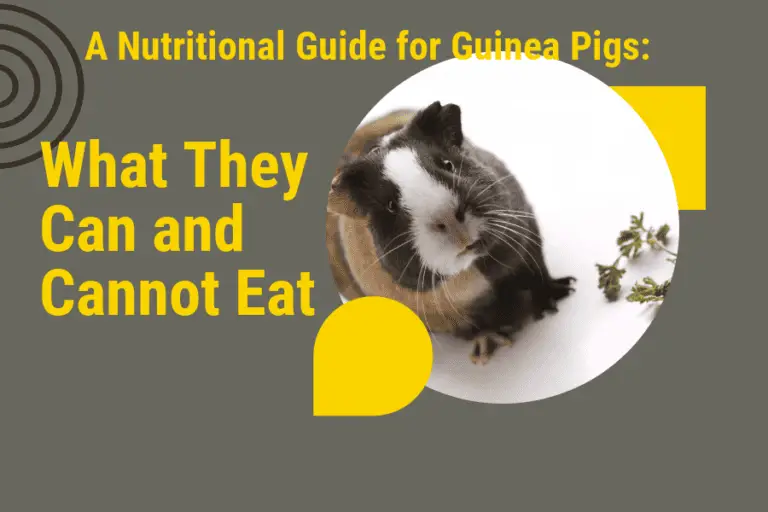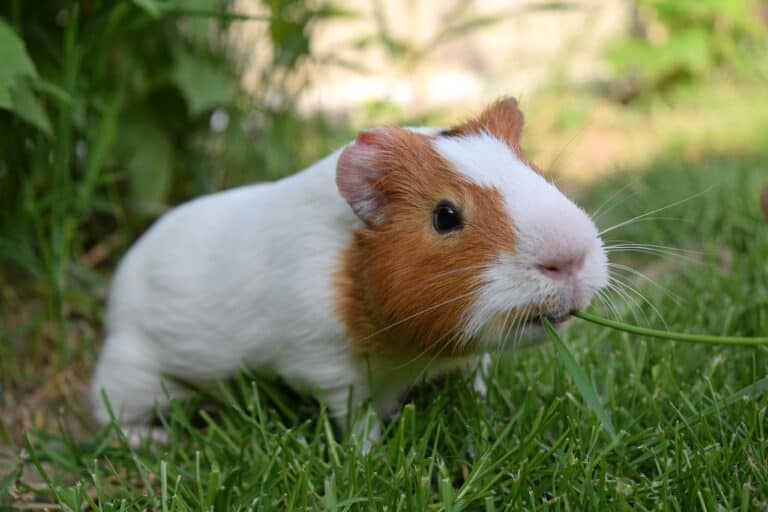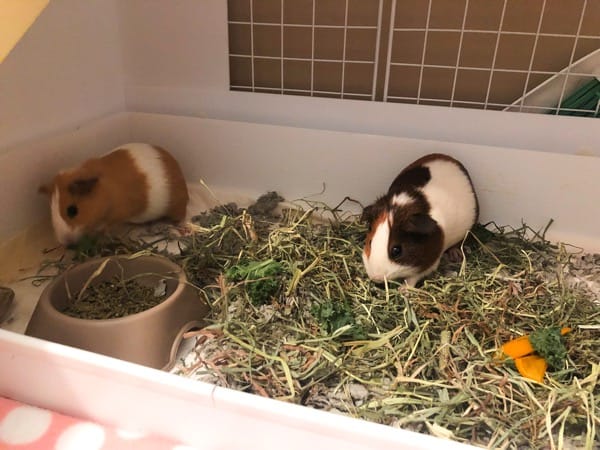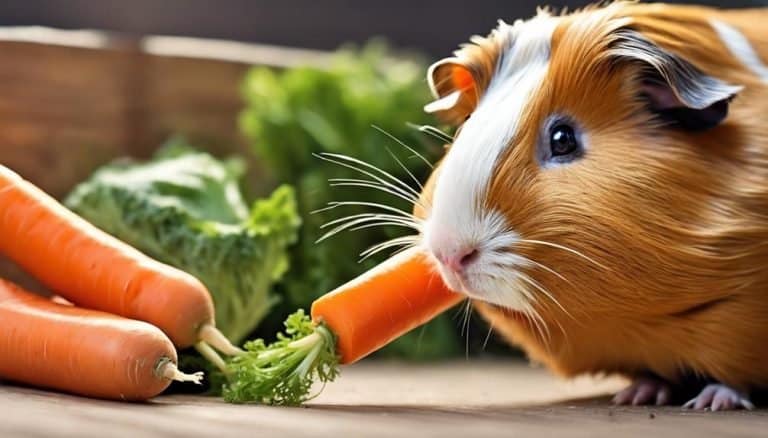Can Guinea Pigs Get COVID-19? An In-Depth Look
Have you ever wondered if your furry little friend, the guinea pig, can contract COVID-19? With the ongoing pandemic, it’s natural to have concerns about the health and safety of all members of our household, including our beloved pets. In this in-depth article, we will explore whether guinea pigs are at risk of getting COVID-19 and what precautions we can take to keep them safe.
Guinea pigs, those adorable creatures with their soft fur and squeaky voices, have become increasingly popular as pets. But can they catch COVID-19? Experts say that while there have been a few reported cases of animals testing positive for the virus, the risk to guinea pigs is extremely low. These small, gentle creatures seem to be largely unaffected by the virus, which comes as a relief to many pet owners.
Understanding COVID-19 and Its Impact on Various Species
Unveiling the Mystery: Can COVID-19 Affect Animals? This intriguing question has piqued the curiosity of scientists worldwide. As the pandemic continues to unfold, researchers have delved into the impact of the virus on various species.
Companion animals have been a major focus, as they play a vital role in our lives. Surprisingly, studies suggest that small animals such as cats and dogs can contract and transmit COVID-19 to some extent. However, the risk of reinfection in these animals is still uncertain. Moving beyond our homes, the situation for zoo animals is slightly different.
Unveiling the Mystery: Can COVID-19 Affect Animals?
As the world grapples with the impact of the COVID-19 pandemic, one question has left scientists puzzled: Can COVID-19 affect animals? While the virus is primarily known to infect humans, recent studies have shed light on its potential impact on different animals. The research indicates that companion animals such as dogs and cats can contract the virus, although cases remain relatively rare.
However, it is important to note that there have been instances of reinfection in animals, raising concerns about the virus’s ability to spread among different species. Scientists are working diligently to understand the implications of COVID-19 on animals, striving to protect not just humans but also our beloved furry friends.
The Role of Pets and Other Small Animals in the Pandemic
As the world continues to grapple with the ongoing pandemic, scientists have been tirelessly studying the impact of COVID-19 on different animals. One question that has puzzled researchers is whether our furry friends can contract the virus. While the majority of cases have been reported in humans, there have been instances of companion animals such as dogs and cats testing positive for the virus. However, it is important to note that the transmission from humans to animals seems to be rare.
The Role of Pets and Other Small Animals in the Pandemic
During these challenging times, companion animals have played a vital role in providing comfort and companionship to individuals and families.
Zoo Animals and COVID-19: What We Know So Far
As we delve into the realm of zoo animals and their encounters with COVID-19, a fascinating tapestry of information unfolds. The virus, known to wreak havoc on human lives, has left no stone unturned in its quest to affect various species. Zoo animals, standing tall as majestic ambassadors of the wild, have not been spared from its grasp.
Scientists and caretakers have diligently observed the behavior of these captivating creatures in a bid to understand the impact of COVID-19 on animals. Preliminary findings reveal that certain species, such as lions and tigers, have indeed tested positive for the virus. However, the cases have been sporadic and isolated, offering a glimmer of hope amidst the uncertainty.
The Case of Mink Farms: A Close Examination of COVID-19 in Mammals
*Amid the pandemic, the plight of mink farms has come into sharp focus. These farms, once bustling with activity, now face uncertainty and challenges. Mink farm workers, like many others, have been impacted by the virus. With questions swirling about whether domesticated animals can contract COVID-19, experts are still searching for answers.
While it is not definitively known if COVID-19 can infect pets, there have been cases of infected mammalian animals. Additionally, concerns have been raised about escaped farm mink potentially spreading the virus.
The Plight of Mink Farms Amid the Pandemic
Transitioning from the previous section, we now turn our attention to the plight of mink farms amid the pandemic. These farms, once bustling with life, are now shrouded in an air of uncertainty and concern. As the virus continues to spread, these furry creatures find themselves at the center of a silent battle.
The impact on mink farms has been devastating, as these animals are highly susceptible to COVID-19. The virus spreads quickly within their close quarters, leaving no escape for these innocent beings. With each passing day, the number of infected minks rises, leaving farm owners grappling with the heartbreaking decision of euthanizing them to prevent further spread.
Can Domesticated Animals Get COVID-19?
The Case of Mink Farms: A Close Examination of COVID-19 in Mammals
As we delve deeper into understanding the impact of COVID-19 on various species, one particular sector that has faced significant challenges is mink farms. These farms, where minks are bred for their fur, have become hotspots for the virus, leading to devastating consequences. The plight of mink farms amid the pandemic highlights the urgent need for understanding the virus’s ability to infect domesticated animals.
While we know that COVID-19 can infect humans and some animals, such as cats and dogs, the question remains: can domesticated animals get COVID-19?
The Debate: Can COVID-19 Infect Pets?
As we delve deeper into the impact of COVID-19 on various species, one burning question arises: can our beloved pets become infected? While we do not definitively know if COVID-19 can infect pets, experts are actively researching this topic to provide us with answers. These inquisitive minds have embarked on studies to examine the susceptibility of our furry friends to the virus. Their findings, published in scientific journals and related pages, shed light on this ongoing debate.
Imagine a scenario where you are spending quality time with your furry companion, their playful energy filling the room. *Would you feel at ease knowing that they could potentially contract the virus?
Evaluating the Risk: COVID-19 Infections and Variants
Evaluating the risk of COVID-19 infections and variants is crucial in understanding the ever-present risk of infection. With the emergence of the COVID-19 UK variant, it is necessary to delve into the implications for animals. Tracking COVID-19 cases through an electronic case study provides valuable insights into the spread and impact of the virus.
Following icon guidance and relying on the icon science agenda can help mitigate the risks associated with the virus. Access to reliable information on onrocketsite is essential for staying informed and making informed decisions. Evaluating the risk is a vital step in protecting ourselves and our communities.
The Ever-Present Risk of Infection
As we delve deeper into the world of COVID-19 and its impact on animals, it becomes clear that the risk of infection is an ever-present concern. While much attention has been focused on the role of mink farms and their workers in the spread of the virus, it is important to recognize that this risk extends far beyond these specific settings. Infection risk is a constant reality for all animals, whether they are in the wild or in captivity.
Animals living in close proximity to humans are particularly vulnerable to contracting the virus. This includes not only our beloved pets, but also wild animals that live in urban areas or come into contact with humans through various means.
The Emergence of COVID-19 Variants: What It Means for Animals
As we continue to delve deeper into the world of COVID-19 and its impact on animals, there is one topic that looms over us all: the emergence of COVID-19 variants and what it means for our beloved creatures. 😊
The ongoing evolution of the virus has led to the emergence of different COVID-19 variants, each with its own set of characteristics and potential implications for animals. These variants, marked by their unique genetic makeup, have raised concerns among scientists and veterinarians alike. While research is still ongoing, it is crucial that we understand the potential risks and take necessary precautions to protect our animal companions.
The emergence of these variants introduces a new layer of uncertainty and complexity to the already challenging situation.
Tracking COVID-19 Cases: An Electronic Case Study
As we delve deeper into the world of COVID-19 and its impact on animals, it becomes increasingly clear that tracking cases is of utmost importance. The ever-present risk of infection looms over our animal populations, and monitoring the spread of the virus is crucial to safeguard their well-being.
Fortunately, advancements in technology have allowed for the development of an electronic case study that enables scientists to closely monitor the transmission of COVID-19 in animals. This groundbreaking tool provides real-time data on the number of cases, allowing researchers to identify patterns and trends that could potentially shape future prevention strategies.
Practical Safety Measures for Pet Owners During the Pandemic
Fresh air and proper ventilation play a crucial role in ensuring the safety of pet owners during the pandemic. Close contact with our furry friends can bring us joy, but it also brings potential coronavirus transmission risks. By maintaining a rigorous cleaning routine and following safety precautions for COVID-19, we can minimize these risks. Opening windows and using an icon home ventilation tool can help circulate fresh air, reducing the concentration of any airborne particles. Additionally, it is important to stay informed about icon resources for pet owners during these challenging times.
Importance of Fresh Air and Ventilation
As we continue to navigate through the COVID-19 pandemic, it is crucial for pet owners to prioritize the safety of both themselves and their beloved furry friends. One important aspect of preventing the spread of the virus is ensuring fresh air and ventilation in our living spaces.
Fresh air plays a significant role in reducing the concentration of coronavirus particles indoors. When indoor spaces are poorly ventilated, the viral particles can linger in the air, increasing the risk of transmission. By allowing fresh air to circulate, we can effectively dilute and remove these particles, minimizing the chances of infection.
Opening windows and doors regularly to allow a flow of fresh air is a simple yet effective measure.
The Role of Close Contact in COVID-19 Transmission
Have you ever stopped to think about how much close contact we have with others on a daily basis? From shaking hands to hugging loved ones, these interactions are a natural part of our lives. However, in the midst of a pandemic, it’s important to understand the role that close contact plays in COVID-19 transmission. Close contact refers to being within six feet of an infected person for a prolonged period of time. This is when the risk of transmission is at its highest.
When we engage in close contact, we unknowingly expose ourselves to the coronavirus that causes COVID-19.
Maintaining a Rigorous Cleaning Routine: Key to COVID-19 Prevention
As we continue to navigate through these challenging times, it is crucial for pet owners to be aware of the practical safety measures they can take to protect themselves and their furry friends from the corona virus. In addition to ensuring fresh air and ventilation in your living space, understanding the role of close contact in COVID-19 transmission is essential. Equally important is maintaining a rigorous cleaning routine, as it serves as a key defense against the virus.
Maintaining a Rigorous Cleaning Routine: Key to COVID-19 Prevention
A clean and sanitized living environment is paramount to safeguarding against the corona virus. Regularly disinfecting frequently touched surfaces, such as door handles, light switches, and countertops, is crucial in minimizing the risk of transmission.
The Role of Vaccines in Preventing COVID-19 in Animals
Decoding the New COVID-19 Vaccine: Can it Protect our Pets? As pet owners, we are concerned about our furry friends’ well-being. Adverse events and the COVID-19 vaccine, are important topics to address. It’s crucial to understand vaccines’ purpose and how they work. With the new COVID-19 vaccine, we want to know if it can protect our pets too. Allergic reactions to vaccines are also a concern, but the benefits outweigh the risks. Moreover, vaccines play a vital role in reducing the transmission of COVID-19 in animals.
Decoding the New COVID-19 Vaccine: Can it Protect our Pets?
As we continue to navigate the ever-evolving landscape of the pandemic, there is one question on the minds of many pet owners: Can the new COVID-19 vaccine protect our beloved furry friends? Let’s dive into the latest information and research to find out.
While much of the focus has been on vaccinating humans, there is growing interest in understanding the potential of the COVID-19 vaccine for our pets. Preliminary studies have shown promising results, indicating that certain vaccines may offer protection against the virus in animals.
Researchers are currently exploring the efficacy of various COVID-19 vaccines in veterinary clinical trials.
Adverse Events and the COVID-19 Vaccine: What Pet Owners Should Know
As vaccines continue to roll out across the globe, pet owners may be wondering about the potential adverse events associated with the COVID-19 vaccine. It’s important for pet parents to stay informed and understand the possible risks and benefits for their furry friends.
The COVID-19 vaccine is primarily designed to protect vaccine recipients from the virus, but it’s important to note that there have been very few reports of adverse events in animals. Clinical care providers and external icon authorities have been closely monitoring the rollout of vaccines in animals, and any potential safety concerns are thoroughly investigated.
COVID-19 Vaccines and Allergic Reactions: A Closer Look
Transitioning from the practical safety measures for pet owners during the pandemic, we now turn our attention to the role of vaccines in preventing COVID-19 in animals. As the world grapples with this ongoing global health crisis, the development of vaccines has been a ray of hope. But what about our beloved pets? Decoding the New COVID-19 Vaccine: Can it Protect our Pets? It’s a question that has been on the minds of many pet owners. While the primary focus of the COVID-19 vaccines has been on protecting humans, there has been growing interest in understanding their potential impact on animals.
Conclusion
In conclusion, it is important for pet owners to understand the potential impact of COVID-19 on various species, including guinea pigs. While there have been cases of the virus in certain mammals, such as minks, the risk of transmission to guinea pigs remains low. It is crucial to continue practicing practical safety measures, such as regular handwashing and maintaining good hygiene, to reduce the risk of transmission to both humans and animals.
As scientists study the virus and its variants, it is reassuring to know that vaccines are playing a crucial role in preventing the spread of COVID-19 in animals. Vaccination not only protects our beloved pets but also helps in controlling the spread of the virus among different species.
By staying informed and following the guidelines provided by health authorities, pet owners can ensure the safety and well-being of their furry companions.

